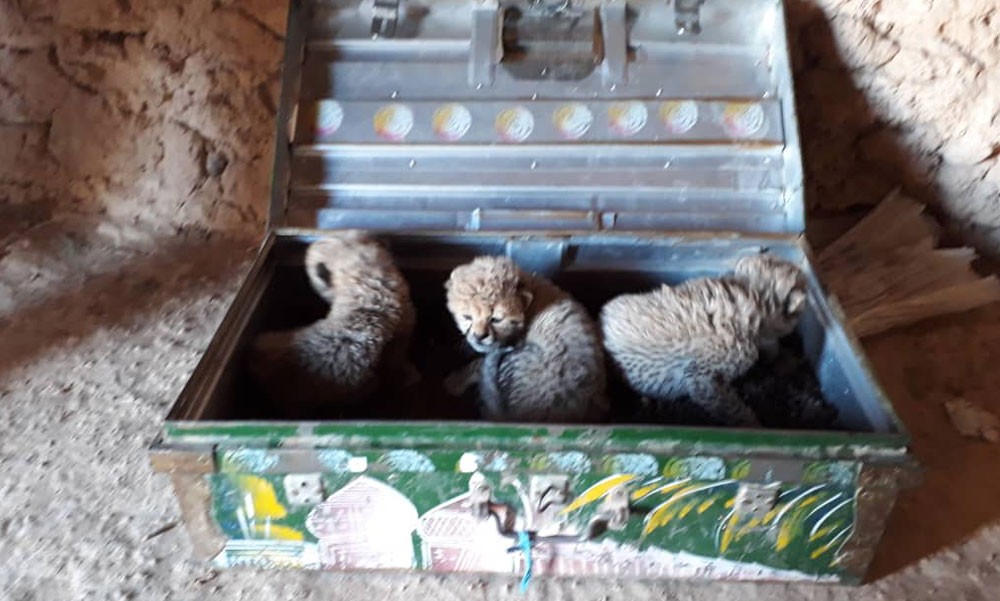Can You Pet Cheetahs? While the allure of owning an exotic pet like a cheetah might seem captivating, it’s essential to understand the realities. PETS.EDU.VN sheds light on why these magnificent creatures belong in the wild and the important conservation efforts in place. Discover the truth about cheetahs as pets and explore responsible alternatives for animal lovers, including valuable resources for responsible pet ownership and conservation.
1. Understanding Cheetahs: More Than Just Big Cats
Cheetahs, the world’s fastest land animals, are much more than just beautiful creatures. They are a vital part of the African ecosystem, and their well-being is crucial to maintaining ecological balance.
1.1. Cheetah Biology and Behavior
Cheetahs (Acinonyx jubatus) are uniquely adapted for speed, with flexible spines, semi-retractable claws, and long legs. Unlike other big cats, cheetahs are diurnal hunters, relying on their eyesight to spot prey during the day. These fascinating animals have a social structure and complex communication methods.
| Feature | Description |
|---|---|
| Scientific Name | Acinonyx jubatus |
| Lifespan | 8-12 years in the wild, up to 20 years in captivity |
| Habitat | Primarily grasslands and savannas of Africa |
| Diet | Carnivorous; primarily gazelles, wildebeest calves, and other small to medium-sized ungulates |
| Social Structure | Males may live in coalitions; females are solitary except when raising cubs |
| Conservation Status | Vulnerable (IUCN Red List) |



1.2. The Plight of the Cheetah: Conservation Status
Sadly, cheetah populations have dwindled significantly due to habitat loss, human-wildlife conflict, and illegal wildlife trade. The International Union for Conservation of Nature (IUCN) lists cheetahs as “Vulnerable,” with fewer than 7,500 remaining in the wild.
Dr. Shira Yashphe, Director of Wildlife Crime and International Policy at the Cheetah Conservation Fund, dedicates herself to safeguarding cheetahs from threats like the illegal pet trade. Image courtesy of cheetah.org
2. The Allure and Illusion of Cheetahs as Pets
The idea of owning a cheetah might seem glamorous, fueled by historical examples and sensationalized media portrayals. However, the reality is far from ideal and carries severe ethical and practical implications.
2.1. A Glimpse into History: Cheetahs as Status Symbols
Historically, cheetahs were kept as symbols of wealth and status by royalty and nobility in ancient civilizations. For example, during his 49-year reign as an Indian Mogul in the 16th century, Akbar the Great, had more than 39,000 cheetahs for coursing, a hunting sport. These practices contributed to the decline of cheetah populations in Asia. More recently, in the 1920s, celebrity Josephine Baker famously owned a pet cheetah named Chiquita.
2.2. The Harsh Reality: Why Cheetahs Don’t Belong in Homes
Despite these historical anecdotes, keeping cheetahs as pets is detrimental to their well-being and conservation.
- Specialized Needs: Cheetahs require vast expanses of land to roam and hunt, a specialized diet that’s difficult to replicate in captivity, and expert veterinary care.
- Inherent Dangers: Cheetahs are powerful predators. Even those raised in captivity retain their wild instincts, posing a significant risk to humans.
- Ethical Concerns: Removing cheetahs from their natural habitat disrupts their social structure and contributes to the decline of wild populations.
2.3. The Dark Side: The Illegal Wildlife Trade
The demand for exotic pets fuels the illegal wildlife trade, which has devastating consequences for cheetah populations. According to the Cheetah Conservation Fund, an estimated 300 cheetah cubs are taken from the wild each year, primarily from the Horn of Africa, to be illegally sold as pets, mainly on the Arabian Peninsula. Many cubs die during transit due to inhumane conditions, and those that survive often suffer from malnutrition and neglect.
Three cheetah cubs confiscated from the illegal wildlife trade in 2019. Image courtesy of cheetah.org
3. The Laws and Ethics of Owning Exotic Pets
Owning exotic animals like cheetahs is not only unethical but also often illegal. Laws vary by country and region, but most jurisdictions have strict regulations regarding the possession of endangered species.
3.1. International and National Laws
The Convention on International Trade in Endangered Species of Wild Fauna and Flora (CITES) regulates the international trade of endangered species, including cheetahs. Many countries have also enacted their own laws to protect wildlife and prevent the illegal pet trade.
| Region/Country | Relevant Legislation |
|---|---|
| United States | Endangered Species Act (ESA), state-level regulations on exotic animal ownership |
| European Union | EU Wildlife Trade Regulations, national laws implementing CITES |
| Africa | National laws protecting wildlife, collaboration with organizations like the Horn of Africa Wildlife Enforcement Network (HAWEN) to combat illegal trade |
| Middle East | Laws vary by country; some nations are actively working with organizations like the Cheetah Conservation Fund to strengthen enforcement and reduce demand for illegal pet cheetahs. |
3.2. Ethical Considerations: Animal Welfare and Conservation
Beyond the legal aspects, there are crucial ethical considerations to contemplate. Keeping cheetahs as pets deprives them of their natural behaviors, social interactions, and the opportunity to contribute to their species’ survival.
3.3. The Impact on Conservation Efforts
The illegal pet trade undermines conservation efforts aimed at protecting cheetah populations and their habitats. By supporting these conservation initiatives, we can ensure that these magnificent animals thrive in the wild for generations to come.
4. Understanding the 5 Core Search Intentions
To deeply address user search intent surrounding the question “Can you pet cheetahs?” we need to understand the various reasons someone might be asking this question. Here are five potential search intentions:
- Informational (Safety): The user wants to know if it’s safe to pet a cheetah in captivity or in the wild.
- Informational (Legality): The user is curious about the legality of owning or interacting with a cheetah in their region.
- Commercial (Experience): The user is looking for experiences where they can interact with cheetahs, such as wildlife sanctuaries or zoos.
- Navigational (Organization): The user is trying to find information about specific cheetah conservation organizations or sanctuaries.
- Curiosity (General): The user is simply curious about cheetahs and their behavior towards humans.
5. Conservation Efforts: Protecting Cheetahs in the Wild
Numerous organizations are working tirelessly to protect cheetahs and their habitats. These efforts include anti-poaching patrols, habitat preservation, community education, and tackling the illegal wildlife trade.
5.1. Key Organizations and Their Missions
- Cheetah Conservation Fund (CCF): CCF is a leading organization dedicated to cheetah conservation through research, education, and community engagement.
- IUCN Cat Specialist Group: This group assesses the conservation status of wild cats, including cheetahs, and provides recommendations for conservation actions.
- Range Wide Conservation Program for Cheetah & Wild Dog Program: This collaborative initiative works to protect cheetahs and wild dogs across their range through research, monitoring, and community-based conservation.
- Horn of Africa Wildlife Enforcement Network (HAWEN): HAWEN is a regional network that combats wildlife trafficking in the Horn of Africa through law enforcement and collaboration.
CCF operates Cheetah Safe Houses in Somaliland, providing care for rescued cubs. Image courtesy of cheetah.org
5.2. How You Can Support Cheetah Conservation
There are many ways to support cheetah conservation efforts, including:
- Donating to conservation organizations: Financial contributions help fund research, anti-poaching patrols, and community education programs.
- Raising awareness: Share information about the threats facing cheetahs and the importance of conservation.
- Supporting sustainable tourism: Visit eco-tourism destinations that prioritize wildlife conservation and community development.
- Avoiding products made from endangered species: Refrain from purchasing items made from cheetah fur or other animal parts.
6. Responsible Pet Ownership: Alternatives to Exotic Animals
If you’re longing for companionship, there are many wonderful domestic animals that make excellent pets.
6.1. The Joys of Domestic Animals
Dogs, cats, rabbits, and other domestic animals have been bred for centuries to live alongside humans, and they offer companionship, affection, and entertainment.
6.2. Matching Pets to Your Lifestyle
When choosing a pet, it’s important to consider your lifestyle, living situation, and ability to provide proper care. PETS.EDU.VN offers valuable resources to help you find the perfect companion animal for your home.
6.3. Supporting Animal Shelters and Rescue Organizations
Adopting a pet from a local animal shelter or rescue organization gives a deserving animal a loving home and helps reduce pet overpopulation.
7. Debunking Common Myths About Exotic Pets
There are many misconceptions surrounding exotic pets, often fueled by misinformation and sensationalized media portrayals. It’s important to dispel these myths and promote responsible attitudes towards animal welfare and conservation.
7.1. Cheetahs are Affectionate Like Domestic Cats
Reality: Cheetahs are wild animals with complex needs and behaviors that are not suited to a domestic environment. They may exhibit behaviors that are misinterpreted as affection, but their primary instincts are those of a predator.
7.2. Cheetahs Can Be Potty-Trained Like Domestic Cats
Reality: Unlike domestic cats, cheetahs cannot be reliably litter-trained. They have strong urine and feces odors that make them unsuitable for indoor living.
7.3. Owning a Cheetah is a Status Symbol
Reality: Keeping a cheetah as a pet is unethical, illegal in many places, and harmful to conservation efforts. True status comes from supporting conservation and protecting endangered species.
7.4. Cheetahs in Captivity are Happy and Well-Cared For
Reality: Cheetahs in captivity often suffer from stress, boredom, and health problems due to their unnatural environment. Even in the best facilities, their needs cannot be fully met.
7.5. Buying a Cheetah Helps Support Conservation
Reality: Purchasing cheetahs fuels the illegal wildlife trade and endangers wild populations. Supporting reputable conservation organizations is the most effective way to help cheetahs.
8. Latest Information and Updates
Staying informed about the latest developments in cheetah conservation and animal welfare is crucial for promoting responsible attitudes and practices.
8.1. New Research Findings
Recent studies have shed light on the genetic diversity of cheetah populations and the impact of habitat fragmentation on their survival. These findings underscore the importance of conservation efforts aimed at protecting their habitats and promoting genetic exchange.
8.2. Conservation Initiatives
New initiatives are underway to combat the illegal wildlife trade and reduce human-wildlife conflict. These include community-based conservation programs, anti-poaching patrols, and efforts to strengthen law enforcement.
8.3. Changes in Legislation
Some countries are strengthening their laws to protect endangered species and prevent the illegal pet trade. These changes reflect a growing recognition of the importance of animal welfare and conservation.
9. Navigating The Challenges
Finding reliable information on cheetahs can be challenging. Let’s look at some questions that people often ask.
9.1. Common Challenges in Pet Ownership Information:
- Lack of Reliable Information: Finding accurate and trustworthy resources about cheetahs is difficult.
- Conflicting Advice: Conflicting advice from different sources can be confusing.
- Behavioral Issues: Understanding and managing wild animal behavior can be complex and potentially dangerous.
- Finding Specialized Services: Locating veterinarians and facilities with expertise in exotic animal care can be challenging.
- Understanding Species-Specific Needs: Grasping the unique dietary, environmental, and social requirements of cheetahs is essential for their well-being.
9.2. How PETS.EDU.VN Addresses These Challenges:
- Comprehensive Information: PETS.EDU.VN offers reliable and in-depth information about the specialized needs of cheetahs and the realities of keeping them as pets.
- Expert Veterinary Advice: Access to expert veterinarians who can provide guidance on the care and well-being of exotic animals, emphasizing why they should not be kept as pets.
- Ethical Considerations: Guidance on the ethical implications of owning a cheetah, focusing on conservation and animal welfare.
- Responsible Pet Ownership: Educating potential pet owners about the responsibilities of pet ownership, highlighting the differences between domestic animals and wild species like cheetahs.
10. FAQ Section
1. Is it legal to own a cheetah?
Owning a cheetah is illegal in most countries due to international and national laws protecting endangered species.
2. What are the welfare concerns for cheetahs kept as pets?
Cheetahs have specialized needs for space, diet, and social interaction that cannot be met in a domestic environment, leading to stress and health problems.
3. How does the illegal pet trade affect cheetah populations?
The illegal pet trade removes cheetahs from their natural habitat, disrupts social structures, and threatens the survival of the species.
4. What can I do to help cheetah conservation?
You can donate to conservation organizations, raise awareness about the threats facing cheetahs, and support sustainable tourism.
5. Are there any circumstances in which it is acceptable to own a cheetah?
Cheetahs should only be kept in accredited zoos and conservation facilities that can provide the specialized care they need.
6. What are the alternatives to owning a cheetah if I want a pet?
Domestic animals like dogs, cats, and rabbits make excellent pets and offer companionship without contributing to the illegal wildlife trade.
7. What are the signs that a cheetah is not doing well in captivity?
Signs of stress in cheetahs include repetitive behaviors, aggression, poor appetite, and health problems.
8. How do I report suspected illegal activity involving cheetahs?
You can report suspected illegal activity to local wildlife authorities or conservation organizations like the Cheetah Conservation Fund.
9. What role do zoos play in cheetah conservation?
Zoos can contribute to conservation through breeding programs, research, and education, but it is important that the zoo is accredited and meets high welfare standards.
10. Can cheetahs be trained like domestic animals?
While cheetahs can be trained to some extent, their wild instincts and behaviors cannot be fully suppressed, making them unsuitable as pets.
Conclusion: Choose Compassion and Conservation
While the idea of petting a cheetah might seem appealing, the reality is that these magnificent animals belong in the wild. By supporting conservation efforts, raising awareness about the illegal wildlife trade, and choosing responsible pet ownership, we can help ensure that cheetahs thrive in their natural habitat for generations to come. Visit pets.edu.vn for more information on responsible pet ownership, animal welfare, and conservation. Contact us at 789 Paw Lane, Petville, CA 91234, United States or Whatsapp: +1 555-987-6543.
Josephine Baker and her cheetah Chiquita. Image courtesy of CSU Archives/Everett Collection / Everett Collection – stock.adobe.com
